Parliamentary election in Latvia, 1 October 2022
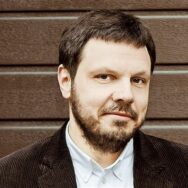
Jānis Ikstens
Professor in Comparative Politics at the University of LatviaIssue
Issue #3Auteurs
Jānis Ikstens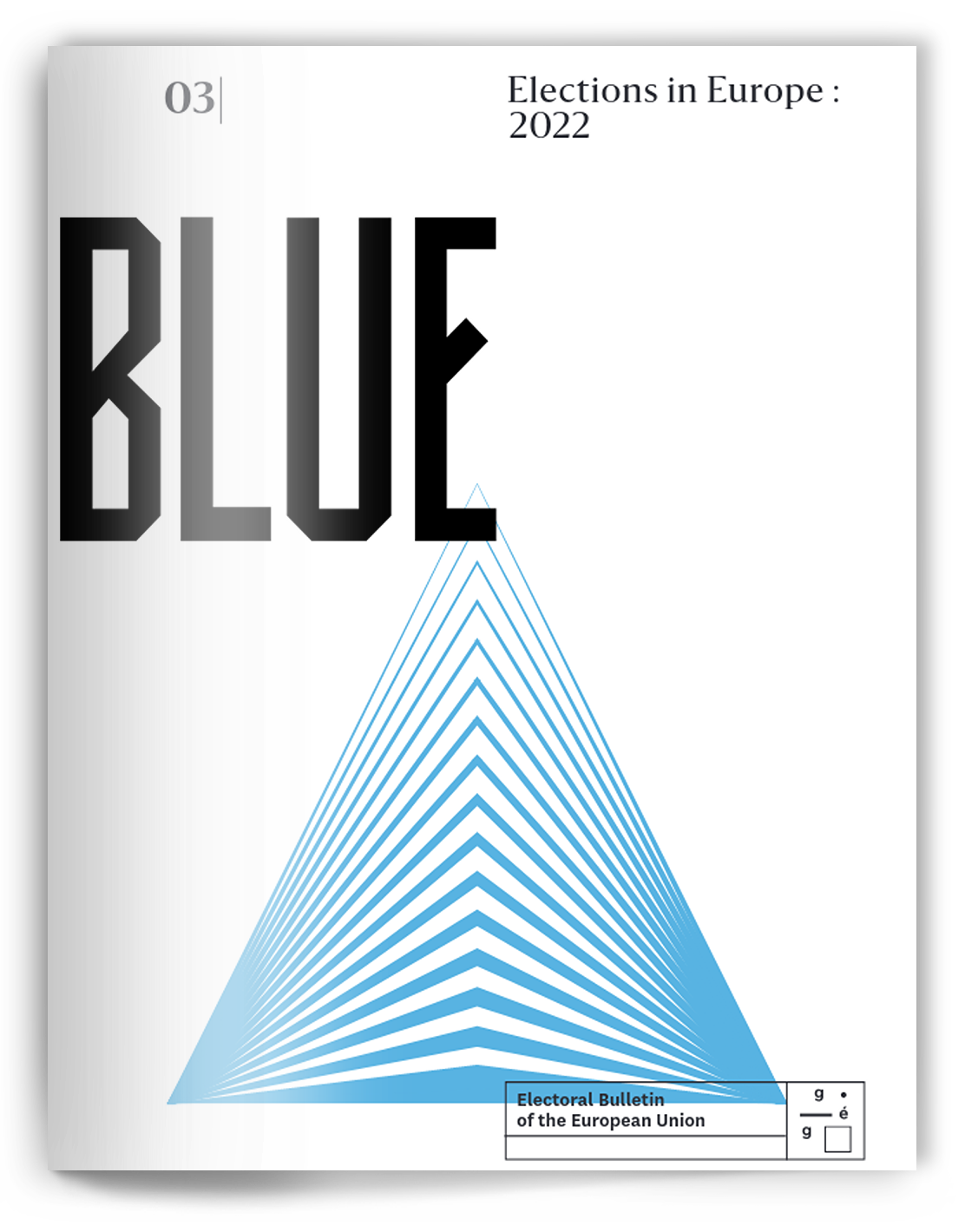
Issue 3, March 2023
Elections in Europe: 2022
The 100-strong unicameral legislature of Latvia, the Saeima, is elected on the first Saturday of October once in four years. The country operates a flexible party list system affording voters the option of casting both negative and positive preference votes. The threshold of five per cent of valid ballots nationally is aimed at reducing the fractionalization of the legislature. Only registered political parties counting no less than 500 members or alliances thereof are eligible to submit candidate lists for five electoral districts. Each candidate can be fielded in one district only.
Background of elections
The parliamentary elections on 1 October 2022 took place against the background of various challenges.
Although the government’s initial response to the COVID-19 outbreak enjoyed the general public’s support, the tide changed when the cabinet led by Krišjānis Kariņš (New Unity) failed the vaccine procurement — not only did it trail behind a number of other European countries timewise but it was also surrounded with suspicions of corruption. That produced a sharp drop of public support to key political institutions in early 2021, from which it did not recover until the election day. Further, when vaccines arrived in numbers sufficient to begin mass vaccination, vocal resistance to it emerged, drawing on perceptions about dangerous side effects of the vaccines that were likely amplified by not only adherents of conspiracy theories and Russian-language misinformation but also the government’s reluctance to swiftly investigate fatalities or major health problems following vaccination. Moreover, several political newcomer parties attempted to capitalize on the anti-vaxx sentiments and the government’s nearly mandatory vaccination policy.
The management of the COVID-19 crisis emerged as a potentially major campaign issue but its importance was dramatically reduced by the escalation of war in Ukraine in February 2022 that large parts of the society perceived as a major threat to Latvia’s independence. The government moved swiftly to ban the access to Russian-origin TV channels in Latvia, close Latvia’s airspace for all aircraft registered in Russia, drastically reduce visa issuance to Russian citizens, and demand a permanent NATO military base on the Latvian soil. Further, the Kariņš cabinet generously provided military aid to Ukraine, with Latvia becoming the top donor. 1 Also, arrangements were made to accommodate Ukrainian refugees, provide them with shelter, food, and education for refugee children.
Latvia’s civil society responded with similar enthusiasm. Several rallies against the Russian aggression were held. As of 15 November 2022, more than 12 million Euro had been donated to the country’s largest charity project, ziedot.lv, for Ukraine’s needs. Many persons welcomed Ukrainian refugees to their homes.
In view of the changing international environment and responding to local demands, the government also proceeded with a further expansion of Latvian as the language of instruction at all institutions of pre-school, primary and secondary education that issue state-recognized educational documents beginning in 2023. The wider introduction of Latvian as the language of instruction began already in 2002 and continued in 2018. Further, the parliament ruled to remove some 300 Soviet-era monuments celebrating the Soviet regime by 15 November 2022. The two measures were not taken lightly by the sizeable Russian minority in Latvia as reflected in the heated parliamentary debates about the respective legislation and by subsequent protests staged near the monuments.
The escalation of war in Ukraine contributed greatly to the already notable inflation rate by way of a global increase of food and energy prices. The inflation in December 2021 stood at 8 percent year-on-year but it rose to 22.2 percent in September 2022, particularly affecting lower income brackets. Responding to wide-spread concerns about the cost of living and availability of heating and electricity in winter, the government capped electricity prices for companies and households, adjusted old-age pensions for inflation well ahead of the schedule but scrambled to convince consumers about the sufficient availability of the natural gas.
Campaign
The legislation requires that all parties wishing to field candidates in the Saeima elections be registered with the Registry of Enterprises no less than 12 months before the election date. This condition was introduced in 2016 with the stated aim of giving voters sufficient time to evaluate political newcomers.
The requirement prompted several political entrepreneurs to establish and register their electoral vehicles. The flamboyant Saeima deputy Aldis Gobzems who was elected on the populist KPV LV party list convoked the founding meeting of the Law and Order party already in January 2021 citing his concern that Latvian authorities could delay the registration of his party and effectively bar Gobzems from running for the parliament. The conservative, traditionalist party with populist overtones and intense criticism of government anti-COVID-19 policies was registered in February 2021. Vjačeslavs Dombrovskis, Saeima deputy elected on the Harmony party list, joined forces with several MPs formerly associated with the defunct KPV LV party to establish the Republic party, a centrist organization aiming to bridge differences in Latvia’s society and to accelerate the country’s economic development. Businessman and former Saeima deputy Ainārs Šlesers announced his plans to establish a political party on the day he was charged with large-scale fraud. The pro-business, socially conservative Latvia First party headed by Šlesers was established in August 2021.
Both the Law and Order party and the Latvia First party initially capitalized on the COVID-19 pandemic and clearly positioned themselves as fierce government critics. The Law and Order part vocally opposed the government’s policy on battling COVID-19 by calling out ineffective government spending on pandemic-related health care measures and giving voice to the anti-vaxx movement. The Latvia First party took a slightly milder stance towards the government public health policies but severely criticized Prime Minister Krišjānis Kariņš for being a weak, indecisive and ineffective leader. That party presented Ainārs Šlesers as a successful and experienced alternative for the premiership in addition to promises to accelerate the country’s economic development by means of attracting foreign investment (including ‘golden visas’) to pay compensations to the anti-vaxxers whose employment contracts were terminated, and to proceed with a socially conservative agenda.
However, the escalation of war in Ukraine drastically affected the campaign. Parties had to define their attitude towards the Russian invasion, which prompted the largest pro-Russian political party, Harmony, to condemn Moscow’s incursion. That move received mixed reactions among the sizeable East Slavic minorities living in Latvia and reinvigorated the Harmony’s competitors — Latvia’s Russian Union and For Stability!. The latter two took a hardline position on the issue of war in Ukraine that aligned well with their previous policies and views of sizeable part of Slavic minorities. Moreover, For Stability! launched an energetic campaign in social media, primarily on Telegram and TikTok, to mobilize younger voters on promises to effectively protect interests of Slavic minorities. The pledge became increasingly appealing after the Saeima (where the Harmony party held 20 seats) ruled to introduce Latvian as the only language of instruction in all state-recognized institutions of pre-school, primary and secondary education.
The influential Mayor of Ventspils City, Aivars Lembergs whose case on charges of money laundering and bribery is in the second instance court after the first instance court issued him a five-year prison sentence, took in early March a dubious position on the escalation in Ukraine that not only drew criticism from the Union of Greens and Farmers (ZZS), an alliance closely associated with Lembergs but also triggered a disintegration of ZZS. As a result, the Green Party of Latvia and the Liepāja Party left the alliance to join forces with the Regional Alliance of Latvia under the leadership of Uldis Pīlēns, a wealthy entrepreneur with certain political experience at the national and municipal level. The resultant alliance under the name of United List (AS) highlighted the need for creating an effective crisis management system at the government level in view of the short supply of energy resources. The United List also presented Pīlēns as an experienced and skilled candidate for the position of Prime Minister.
The Farmers’ Union of Latvia, however, managed to retain the brand of ZZS as it invited the Social Democratic Workers’ Party of Latvia to join ZZS. Moreover, ZZS returned to Lembergs as its candidate for the Prime Minister’s position (Lembergs had been ZZS’s prime ministerial candidate until 2018). This move drew notable criticism in the media and led to several public debates exclude Lembergs. On the other hand, his approval ratings remained high and clearly helped mobilize ZZS supporters.
Parties of the ruling coalition took pride in having a stable government for the entire parliamentary term since 2018, an achievement noteworthy for Latvia’s volatile political milieu that was largely conditioned by the pandemic and the constellation of political forces. They also were unanimous in pledging increased funding for the country’s defense and in replacing professional military service with conscription. However, the coalition parties had to respond to yet another challenge — a slower economic development of Latvia in comparison to Estonia and Lithuania. While the parties were swift to blame the pandemic and choices upon the exit from the 2009 economic meltdown that were never clearly defined, doubts about the government’s economic policies strengthened against the background of uncertainty surrounding the availability of energy supplies for the 2022/2023 winter. In an attempt to pacify some groups ahead of the winter, the government chose to adjust old-age pensions two months ahead of the usual schedule but the effect of the measure remains to be identified.
However, coalition parties pursued individual efforts as well. The Development/For! alliance had seen substantial decrease in public support over the last wo years that likely stemmed not only from being in charge of Health Ministry and designing of anti-pandemic policies but also from involvement in allegedly illegal practices of political finance 2 and lobbying casino business interests. Moreover, this alliance had to compete with the Progressives, another left-libertarian party that, as a relative political newcomer that had achieved commendable results in the municipal elections in capital city of Rīga. The Development/For!, known for massive election campaigns, desperately began to criticize Prime Minister Kariņš for indecisiveness but fell short of offering a radically different economic policy.
The Conservatives had lost two key leaders and struggled to keep up with the National Alliance, another coalition partner who lost some supporters to the Conservatives in the 2018 elections. While the Conservatives mildly flirted with Catholic voters, they also promoted a legal arrangement of single-sex partners that was arguably seen by Conservatives’ supporters as contradicting to their core values. Meanwhile, the National Alliance traditionally made appeals to Latvian nationalists referring to recent changes in the language regime in education, continued to emphasize its solutions for Latvia’s demographic problems, and kept relatively low profile on economic issues. The loss of NA support (compared to the 2018 results) under the circumstances of intensification of war in Ukraine seems to be partly related to a lack of a strong candidate for the position of Prime Minister.
New Unity offered a catch-all platform to be implemented under the leadership of Krišjānis Kariņš. Many political competitors criticized him not only for meager leadership but also for evading public discussion during the campaign. Yet, Foreign Minister Edgars Rinkēvičs of New Unity seemingly compensated for the meagerness by stepping up a Twitter campaign projecting him as a decisive leader.
Results
A total of 19 candidate lists were registered for the elections, an increase from 16 lists in 2018 and 14 lists in 2014. The expanding number of contenders can be seen as a function of the greatly increased public funding to political parties garnering at least 2 per cent of votes in parliamentary elections.
The political elite was somewhat nervous about the constantly falling voter turnout that slid to 54.56 percent in 2018. The turnout was expected to decrease again in 2022 as the start of Russian-Ukrainian war did not boost the turnout in the 2014 Saeima elections. Contrary to the expectations, more voters chose to participate, with the turnout reaching 59.41 per cent. The electoral district of Latgale where many Slavic voters reside saw the largest turnout increase. They were likely mobilized by identity issues.
As in 2018, seven lists cleared the electoral threshold but a few surprises were involved. The long-dwindling support for Harmony resulted in a loss of parliamentary representation for this political dinosaur. Some of Harmony’s erstwhile supporters likely sided with For Stability! and Latvia’s Russian Union, others arguably switched to ZZS while yet others abstained. Another well-known political brand, ZZS, fared surprisingly well and came second gaining 17 seats. This arguably underscores the role of strong electoral leaders — while ZZS chose the polarizing Lembergs as its candidate for premiership, Harmony settled for the experienced, yet lesser known parliamentarian Ivars Zariņš. Although the poor showing of the Conservatives was hardly surprising, the frantic end of Development/For! campaign bore no fruits parliamentary representation – likely for reasons mentioned above. The Progressives arguably attracted the bulk of former Development/For! supporters by offering a left-libertarian platform along with a cleaner political record. Further, the rapid ascent of For Stability! past the rival Latvia’s Russian Union merits attention given the former’s Euroskeptic and ethnically radical platform. The Latvia First attracted many protest voters who switched away from the strongly critical For Each and Every One (formerly — Law and Order) headed by Aldis Gobzems who had lost much of his credibility due to frequent outbursts of rage. New Unity turned out to become a focal point for voters who were content with the government’s policies. Arguably, the United List benefitted from the merger of three minor parties and the galvanizing persona of Uldis Pīlēns who was capable to convince large segments of population about his qualities as a successful crisis manager.
Outlook
The 2022 elections brought crushing defeat for the populist forces among ethnic Latvians. However, the populist wave has reached the Slavic minorities and For Stability! will ride it during the present parliamentary term. Moreover, the success of For Stability! is an indication of radicalization of Slavic minorities in Latvia.
The United List will have to find its modus operandi both in the parliament and the cabinet in view of the fact that Uldis Pīlēns, the main inspirator of the project, did not run for the parliament and will likely remain outside the cabinet as well. Ultimately, constituent parts of AS will have to decide whether they are prepared to give up their individual identities and merge into a single political organization.
The election results have produced prospects of a right-of-the-center, pro-European minimum-winning coalition to emerge. Given the ideological differences between the National Alliance and the Progressives that were voiced soon after the polls closed as well as the ongoing court proceedings against Aivars Lembergs, the number of viable coalitions is strictly limited. Social protection against the high inflation under the circumstances of the ongoing war in Ukraine and of notable budget deficit incurred during the pandemic will be a major challenge in a foreseeable future.
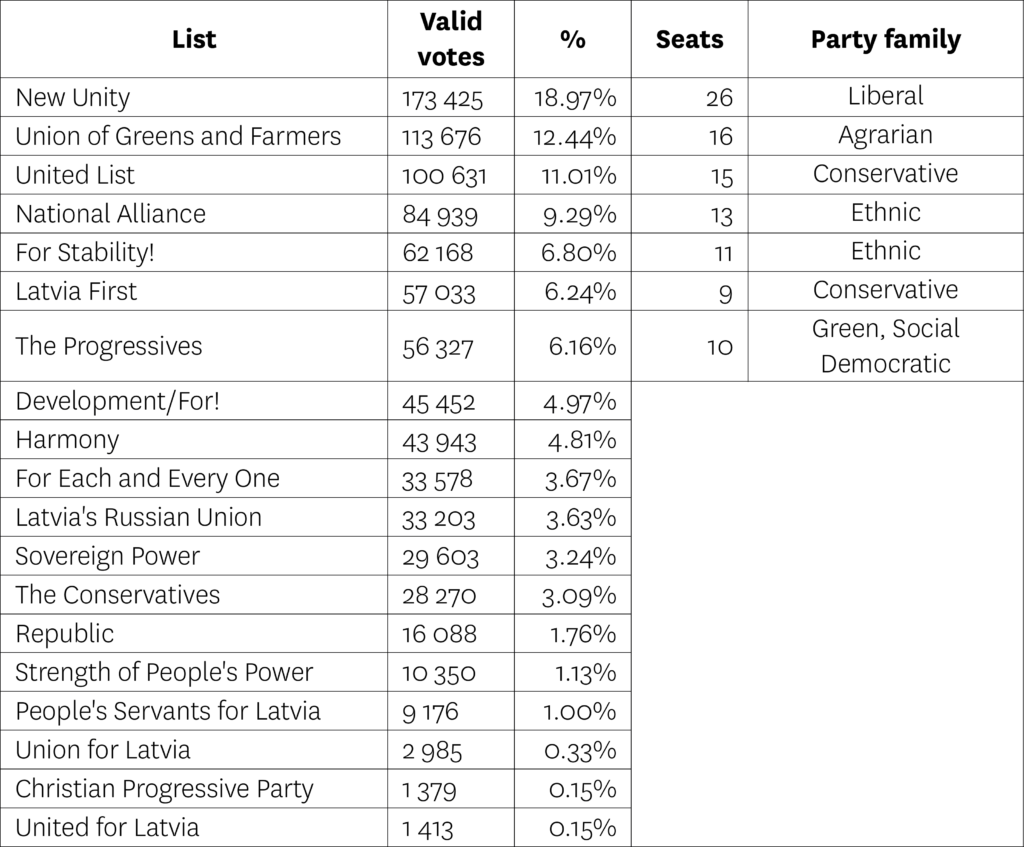
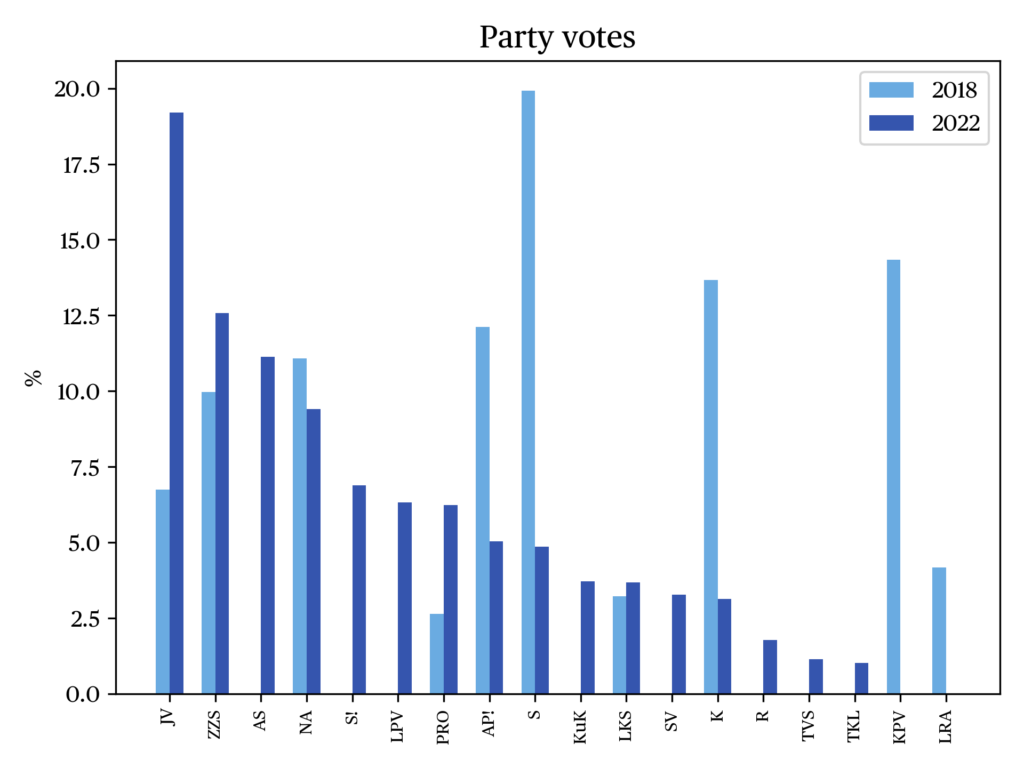
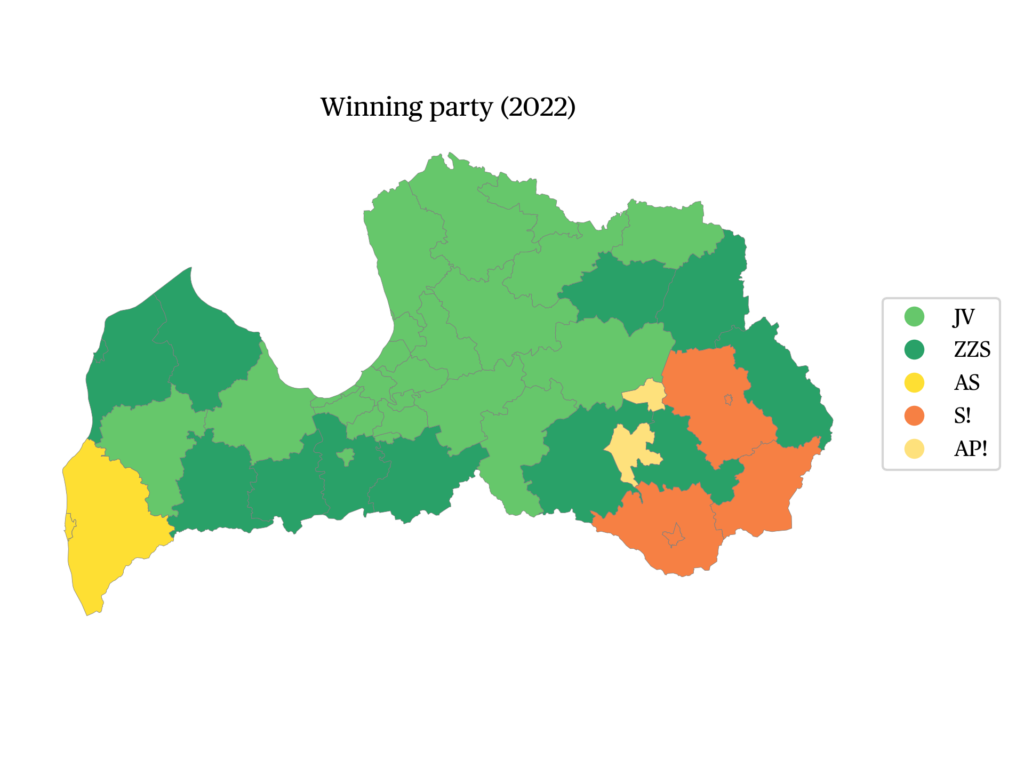
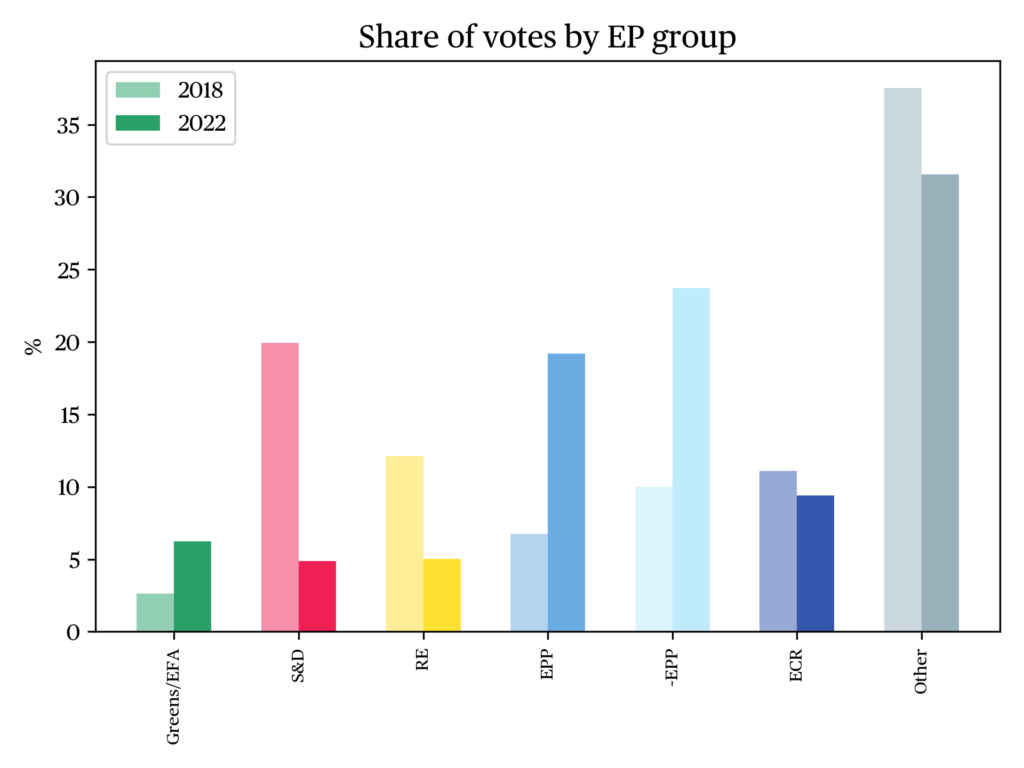
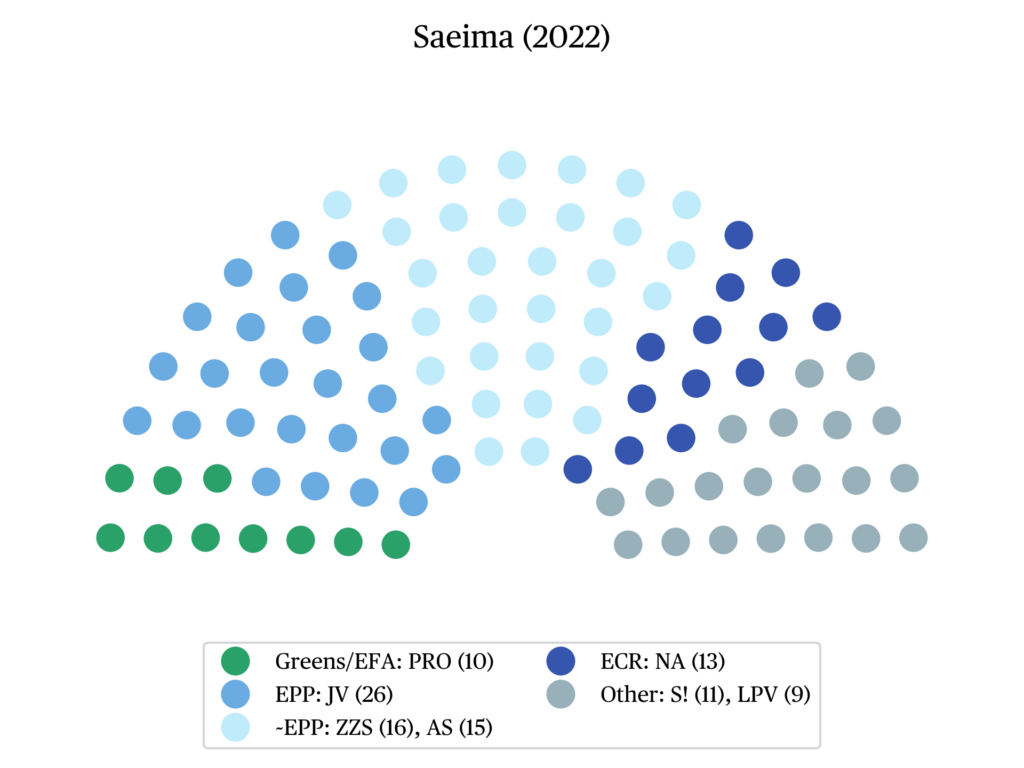
Notes
- For details, see: https://eng.lsm.lv/article/society/society/latvia-ranks-first-in-aid-to-ukraine-by-gdp-share.a477661/ (last accessed 15 November 2022).
- Māris Mičerevskis of For Latvia’s Development party claimed that Juris Pūce, one of party leaders, repeatedly gave him cash to donate to the party. However, the Anti-corruption Bureau tasked with the enforcement of party finance legislation could not prove the claims.
citer l'article
Jānis Ikstens, Parliamentary election in Latvia, 1 October 2022, Mar 2023, 121-125.
à lire dans cette issue
voir toute la revue





